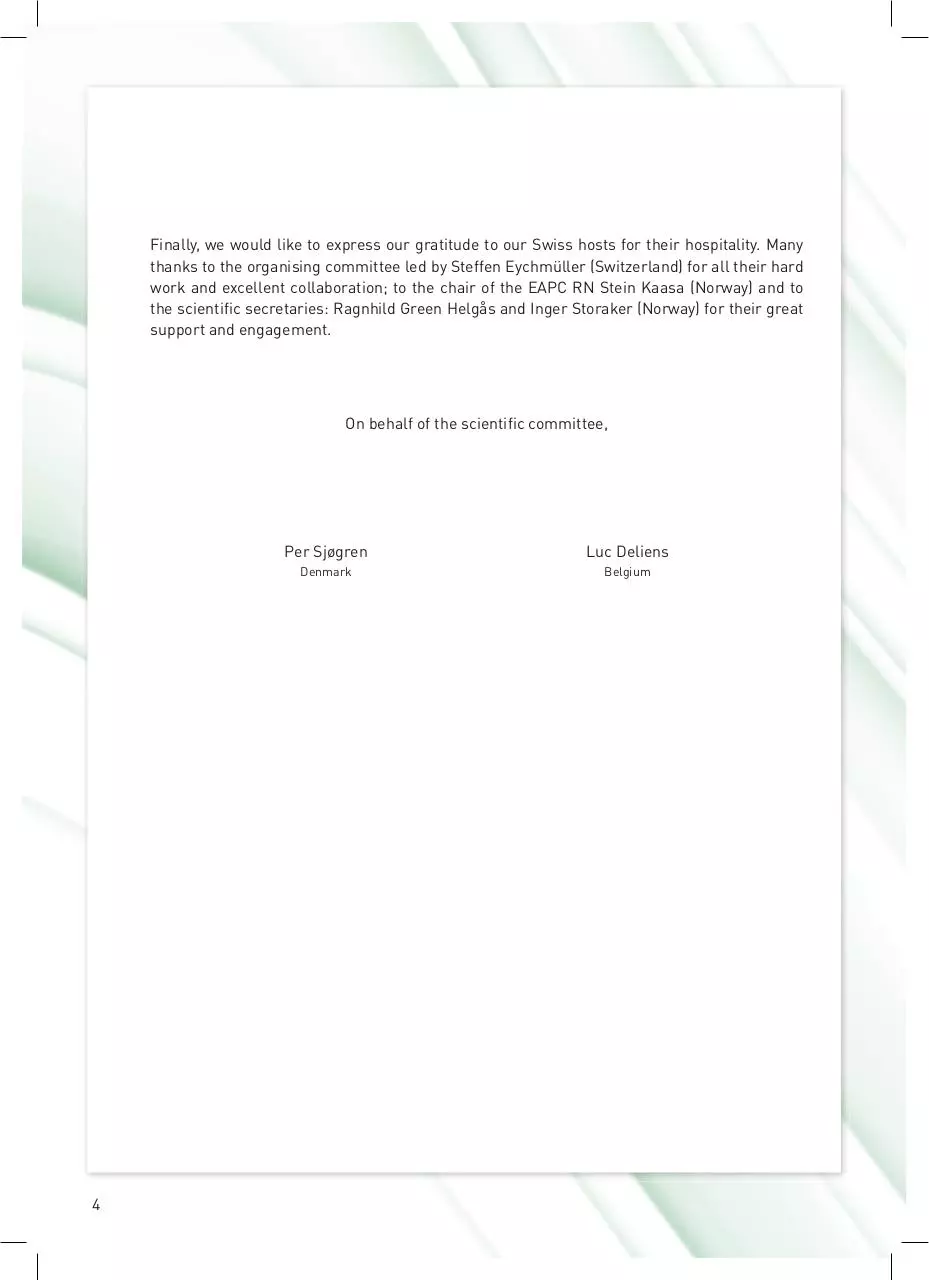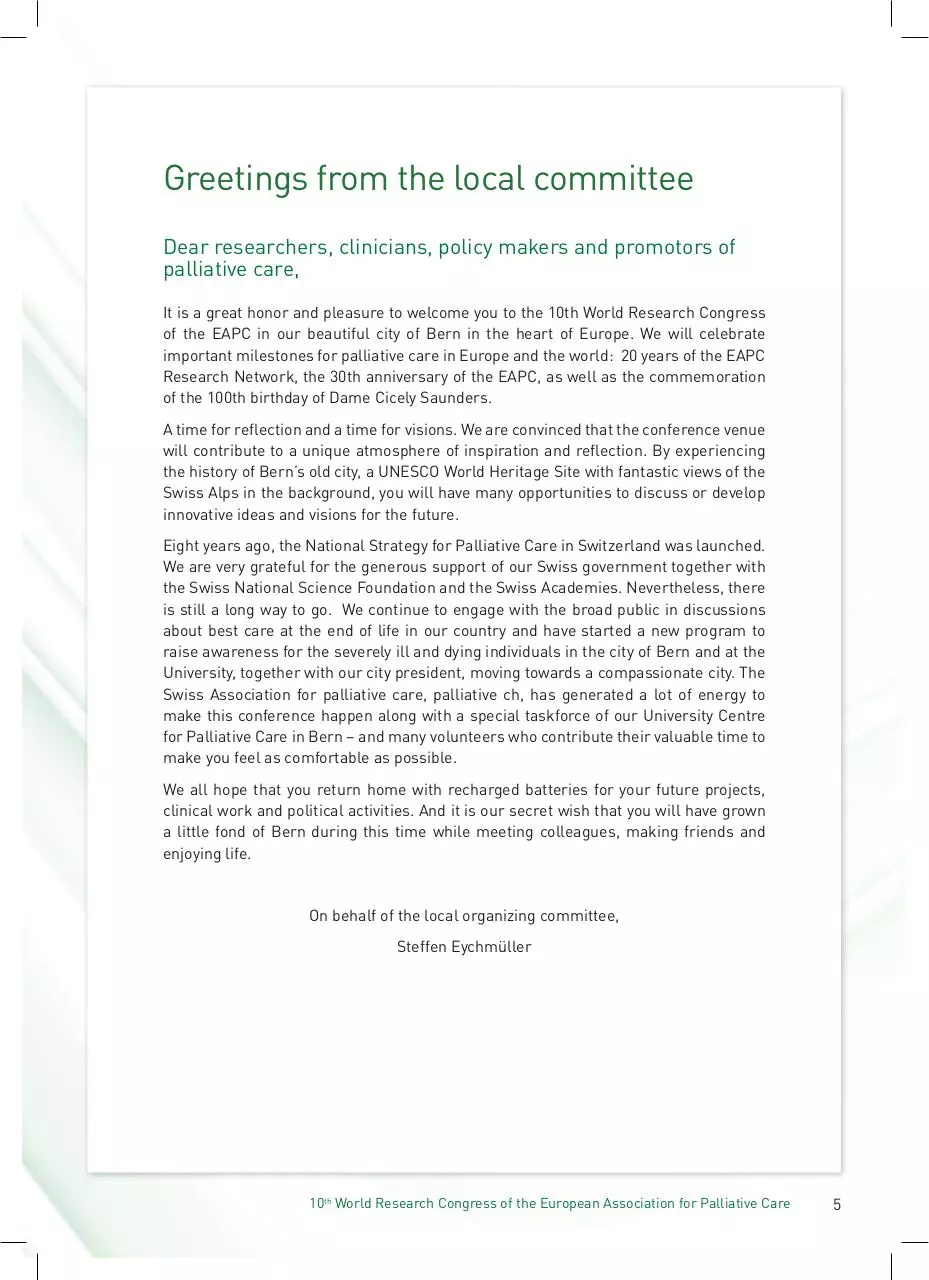Program EAPC WRC2018 TrykkNY (1) lq5 (PDF)
File information
Title: 143150_Program_WRC2018.indd
This PDF 1.3 document has been generated by Adobe InDesign CC 13.1 (Macintosh) / Adobe PDF Library 15.0, and has been sent on pdf-archive.com on 16/05/2018 at 10:55, from IP address 195.242.x.x.
The current document download page has been viewed 413 times.
File size: 7.66 MB (84 pages).
Privacy: public file





File preview
PROGRAMME
EAPC
vzw
gemeinsam + kompetent
ensemble + compétent
insieme + con competenza
www.eapcnet.eu/research2018
Table of contents
Welcome from the committees .........................................................................
3
Presentation of the committees .........................................................................
7
Description of the scientific programme............................................................
8
Programme at glance .........................................................................................
10
Scientific programme .........................................................................................
13
Open meetings ................................................................................................
31
Poster overview...................................................................................................
32
Information for speakers ....................................................................................
63
Information for poster presenters......................................................................
63
Credits .................................................................................................................
64
Researcher Awards.............................................................................................
66
The European Association for Palliative Care (EAPC) and EAPC RN ................
68
Palliative care in Switzerland .............................................................................
69
Exhibitor floor plan .............................................................................................
70
Congress information .........................................................................................
72
Acknowledgements ............................................................................................
74
Attachments:
Conflict of interest forms from scientific and organising committees ..............
78
Welcome to the 10th World Research
Congress of the European Association
for Palliative Care
Dear colleagues and friends,
It is a pleasure to welcome you to the 10th World Research Congress of the EAPC in
Bern. This is the tenth time that we seek to bring together the best researchers and
clinicians in palliative care. There will be excellent opportunities to meet other experts
in the field, to present and discuss research, gain new ideas and new knowledge on
how to improve treatment and care for patients and their families.
For the past two years the scientific committee has worked on and planned the
scientific programme. We would like to thank the members of the committee for all
their hard work and efforts: Cinzia Brunelli (Italy), Phil Larkin (Ireland), Stein Kaasa
(Norway), Roman Rolke (Germany), Cristina Monforte (Spain), Sophie Pautex and
Monica Fliedner (Switzerland).
Global interest for research in palliative care is increasing rapidly and the 10th
World Research Congress of the EAPC contains a substantial number of high-quality
abstracts. This time we received 897 abstracts from 55 countries all over the world.
The highest submission rates are from UK (166), Netherlands (89) and Switzerland
(66). A solid, local presence is therefore expected. This year, categories were more
differentiated than previously, also by research methodology, in order to make a more
precise and relevant programme. Indeed, this contribution recognizes that palliative
care research is steadily improving and large international collaborative research
initiatives are certainly paying off.
The major part of the scientific content of the programme is based upon submitted
abstracts. Each abstract is reviewed by two to three independent reviewers from an
advisory board consisting of 114 skilled experts from different fields and countries. We
are grateful to all our colleagues who have undertaken this important piece of work.
The highest ranked abstracts are prioritised as 1) plenary talks, 2) oral communication
sessions, 3) method discussion sessions and 4) poster presentations. For the first
time, the programme offers different streams that could facilitate your programme
choice: Cancer and Palliative Care (the green stream), Public Health & Policy (the blue
stream), Ageing & Palliative Care (the red stream), Free standing sessions (the yellow
stream), and two Method Discussion Sessions. By defining these streams, we hope to
avoid related subjects being presented in parallel session at the same time.
10th World Research Congress of the European Association for Palliative Care
3
Finally, we would like to express our gratitude to our Swiss hosts for their hospitality. Many
thanks to the organising committee led by Steffen Eychmüller (Switzerland) for all their hard
work and excellent collaboration; to the chair of the EAPC RN Stein Kaasa (Norway) and to
the scientific secretaries: Ragnhild Green Helgås and Inger Storaker (Norway) for their great
support and engagement.
On behalf of the scientific committee,
4
Per Sjøgren
Luc Deliens
Denmark
Belgium
Greetings from the local committee
Dear researchers, clinicians, policy makers and promotors of
palliative care,
It is a great honor and pleasure to welcome you to the 10th World Research Congress
of the EAPC in our beautiful city of Bern in the heart of Europe. We will celebrate
important milestones for palliative care in Europe and the world: 20 years of the EAPC
Research Network, the 30th anniversary of the EAPC, as well as the commemoration
of the 100th birthday of Dame Cicely Saunders.
A time for reflection and a time for visions. We are convinced that the conference venue
will contribute to a unique atmosphere of inspiration and reflection. By experiencing
the history of Bern’s old city, a UNESCO World Heritage Site with fantastic views of the
Swiss Alps in the background, you will have many opportunities to discuss or develop
innovative ideas and visions for the future.
Eight years ago, the National Strategy for Palliative Care in Switzerland was launched.
We are very grateful for the generous support of our Swiss government together with
the Swiss National Science Foundation and the Swiss Academies. Nevertheless, there
is still a long way to go. We continue to engage with the broad public in discussions
about best care at the end of life in our country and have started a new program to
raise awareness for the severely ill and dying individuals in the city of Bern and at the
University, together with our city president, moving towards a compassionate city. The
Swiss Association for palliative care, palliative ch, has generated a lot of energy to
make this conference happen along with a special taskforce of our University Centre
for Palliative Care in Bern – and many volunteers who contribute their valuable time to
make you feel as comfortable as possible.
We all hope that you return home with recharged batteries for your future projects,
clinical work and political activities. And it is our secret wish that you will have grown
a little fond of Bern during this time while meeting colleagues, making friends and
enjoying life.
On behalf of the local organizing committee,
Steffen Eychmüller
10th World Research Congress of the European Association for Palliative Care
5
Scientific
content
6
Presentation of the committees
Scientific committee
Luc Deliens (co-chair)
Per Sjøgren (co-chair)
Phil Larkin
Stein Kaasa
Cinzia Brunelli
Roman Rolke
Cristina Monforte Roya
Sophie Pautex
Monica Fliedner
Scientific secretariat
Ragnhild Green Helgås
Inger Storaker
Ingeborg Megård Leinan
Corresponding
members
Michael I. Bennett
Sushma Bhatnagar
Eduardo Bruera
Augusto Caraceni
Massimo Costantini
David Currow
Franco De Conno
Gustavo De Simone
Sylwia DziefielewskaGesiak
Robin Fainsinger
Marie Fallon
Jon Håvard Loge
Staffan Lundström
Marco Maltoni
Christoph Ostgathe
Judy Paice
Sheila Payne
Cibele Pimenta
Richard Powell
Jane Seymour
Florian Strasser
Raymond Voltz
Advisory board
Nina Aass
Trude Rakel Balstad
Vickie Baracos
Claudia Bausewein
Monica Beccaro
Gerhild Becker
Lynda Brook
Bridget Candy
Carlos Centeno
Kenneth Chambaere
Kin-Sang Chan
Joachim Cohen
John Ellershaw
Frank Ferris
Marilène Filbet
Kathleen Foley
Karen Forbes
Katherine Froggatt
Carl Johan Fürst
Giovanni Gambassi
Barbara Gomes
Merryn Gott
Gunn Grande
Mogens Groenvold
Richard Harding
Dagny Faksvåg Haugen
David Kissane
Pål Klepstad
Geana Kurita
Barry Laird
Peter Lawlor
Mari Lloyd-Williams
Martin Loucka
Matthew Maddocks
Sebastiano Mercadante
Guido Miccinesi
Tatsuya Morita
Sean Morrison
Daniela Mosoiu
Christof Mueller-Busch
Scott Murray
Kyriaki Mystakidou
Maria Nabal
Mette Asbjørn Neergaard
Bregje OnwuteakaPhilipsen
Roeline Pasman
Carlo Peruselli
Josep Porta Sales
Russell K. Portenoy
Julia Riley
Gary Rodin
Joy Ross
Tamari Rukhadze
Tiina Saarto
Kari Sand
Katrin Sigurdardottir
Tora Skeidsvoll Solheim
Peter Speck
Anna Thit Johnsen
Lieve Van den Block
Bart Van den Eynden
Agnes van der Heide
Charles von Gunten
Kirsten Wentlandt
Local organising
committee
Walter Brunner
Steffen Eychmüller
Maud Maessen
Anja Maurer
Beat Müller
Kathrin Sommer
Myriam Tapernoux
Lea von Wartburg
Raoul Wanger
Sofia Zambrano
EAPC Head Office
Julie Ling
10th World Research Congress of the European Association for Palliative Care
7
Description of the scientific programme
Ventafridda lecture
The Vittorio Ventafridda lecture in Bern will be given by Professor of palliative care
Irene J. Higginson, Director of Cicely Saunders Institute, King’s College London, UK:
Future-proofing Dame Cicely Saunders’ Centenary of Change: Integrating research,
education and clinical care
Dame Cicely Saunders, widely acknowledged for her role in the birth of the hospice
movement, was born in June 1918, 100 years ago. Professor Vittorio Ventafridda
was born almost a decade later in October 1927. Together in Europe and across the
world the work of Saunders and Ventafridda has transformed the landscape of pain
management and sparked a palliative care movement. Their legacy has led to World
Health Organisation guidance, the founding of the European Association of Palliative
Care, advocacy for pain relief and palliative care, particularly for older people, children
and marginalised populations. We have seen hospices and palliative care services
grow and adapt in culturally appropriate ways worldwide.
However, societies across the world are facing unprecedented changes in the current
and likely future needs for palliative care, as the 2017 Lancet Commission on Palliative
Care underscores. Estimates indicate that in the next 25 years, by 2040, the number
of deaths will grow by around 25 to 30%. This coupled with population ageing and
increased chronic illness and multimorbidity is likely to lead to a 42% increase in the
need for palliative care.
The diseases and symptoms faced by patients and families are ever more complex,
and although there have been many advances in symptom management, particularly
pain, there remain many questions and gaps in knowledge and skills. These questions
urgently need to be answered, creating better knowledge and from this better
education, better policy and better care.
Integration is already standard for palliative care in oncology. With other specialties,
such as neurology or respiratory medicine, integration with palliative care is slow
and lacking evidence. The pursuit of medicine for cure raises continued challenges
for those who wish to focus on care. However, we now know that improving care can
also lead to improvements in survival. The future of palliative care will rely on the
generation of better knowledge and its translation into practice and policy. the better
integration of research, education and clinical care will be essential to future-proof
palliative care.
This presentation will discuss some of the key advances made in the integration
of research, education and care, and the integration of palliative care with other
specialties to improve our knowledge and the support given for patients and families.
8
Themed sessions (invited)
• Research methodology – how to’s
• Nursing research in palliative care
• Early palliative care: Where to go from here?
• Caring for palliative care patients at home
• Challenges in the design and application of economic evaluation in palliative care
research
• The need for national research programmes
A total of 897 abstracts were submitted, from 55 countries. Of these, 63 were rejected
due to a low average review score. The remaining abstracts will be presented in the
following categories:
Plenary abstracts
5 outstanding abstracts were selected for oral presentation in the plenary sessions.
Free communication abstracts
114 abstracts with high scores were selected for oral presentations in parallel sessions.
In addition, a dedicated session for Swiss presentations will be held on Thursday.
Method discussion abstracts
12 abstracts with high scores were selected for method discussion sessions, which
have a stronger focus on methodological challenges and study design.
Poster presentations
More than 350 abstracts will be presented as poster presentations in one poster set
which is available for the duration of the congress.
Print only
Abstracts that were accepted, but did not achieve a high enough score for a poster
presentation, will be published in an online special edition of Palliative Medicine by
Sage.
Unsuccessful abstracts
Abstracts with an average score lower than 1.5 were rejected by the scientific
committee.
10th World Research Congress of the European Association for Palliative Care
9
Download Program EAPC WRC2018 TrykkNY (1) lq5
Program_EAPC_WRC2018_TrykkNY (1)_lq5.pdf (PDF, 7.66 MB)
Download PDF
Share this file on social networks
Link to this page
Permanent link
Use the permanent link to the download page to share your document on Facebook, Twitter, LinkedIn, or directly with a contact by e-Mail, Messenger, Whatsapp, Line..
Short link
Use the short link to share your document on Twitter or by text message (SMS)
HTML Code
Copy the following HTML code to share your document on a Website or Blog
QR Code to this page

This file has been shared publicly by a user of PDF Archive.
Document ID: 0001874277.